Introduction
Established in the year 1984,
Department of Electronics and Communication Engineering strives to be the best performing department of Rewa Engineering College.
With faculty strength of tenmembers who are specialized in various emerging areas such as VLSI design, Signal Processing,
Digital Techniques and Embedded System, combined with the available lab facilities,
we have tremendous potential to train our students for an excellent career.
Quick Facts
Year of Start
: 1984
Head of Deapartment
: Prof. A. K. Buchke
Courses
: BTech. InElectronics and Communication Engineering
University
: RGPV, Bhopal
Student Intake
: 60
Down the Memory Lane
Department of Electronics and Communication Engineering has been officiated as HOD by many professors
since its adaption in the college in 1984. Dr. S. K. Paranjape (Retd. Director of Tech. Education)
was the first Head of Department.
A complete list of HODs of this department is as follows:
- Dr. S. K. Paranjape
- Prof. B. K. Joshi
- Prof. ShreeshVerma
- Prof. M. R. Meshram
- Prof. Sanjay Agrawal
- Prof. N. L. Prajapati
- Prof. M. R. Ahirwar
- Prof. A. K. Buchke
Under the valuable supervision and guidance of the above Heads, this department flourished and made progress continuously. Several laboratories were established and are equipped with equipments, instruments and infrastructure needed for conducting various courses of the department as stipulated by the university.
About the Department
The Department of Electronics and Communication Engineering of Rewa Engineering College was established in the year 1984. It was developed under the guidance and supervision of Dr. S. K. Paranjape (Retd. Director of Technical Education).
The Department is affiliated to the Rajiv Gandhi ProudyogikiVishwavidyalaya (RGPV), Bhopal. It offers four year Programme for Bachelor of Technology in Electronics and Communication Engineering. The present first year intake is 60 seats.
Prof. A. K. Buchke is the Head of Department since 10/10/1990. Along with him is a team of one Professor and four Assistant Professors as Regular Faculty. Since January 2018 one more Assistant Professor joined the team as part of the TEQIP-3 project. Three more Assistant Professors joined as part of this project since September, 2018.
Presently, the department has two Ph.D. holders and eight MTech/ M.E. holders in the faculty.
The supporting technical team has a size of three who are qualified in various trades.
The Department is constantly striving for improvements in order to keep up with the competitions. It has also applied for NBA Accreditation in the year 2019 and is working toward achieving this.
Message from HOD
Hello everyone, greeting from Electronics and Communication Engineering department.
We welcome you to ECE department, REC Rewa (M.P.). Our branch was established in the year 1984, in REC REWA which is a premiere institute of vindhya region. Our intake in every batch is around 60. We have 6 well established labs along with highly qualified faculties.
As we all know that whole world was affected from pandemic, we adopted to online teaching & intend to pursue blended mode of teaching in future. We strive for quality teaching & learning.
With warm regards
Prof. A. K. Buchke
Professor&Head of Department.
Vision of the Department
To become the centre of academic excellence for producing engineering graduates who are industry competent and are entrepreneurs in the field of electronics and communication engineering.
Mission of the Department
To impart quality education through effective teaching - learning techniques.
To make the students industry competent by integrating class room learning with well-equipped laboratory experiences.
Enrich students with effective communication and personal development skills.
Providing the environment of research to young minds for continuous learning.
Program Educational Objectives (PEOs)
At the end of program, graduates will be able to:
PEO1: Contribute to significant changes as competent engineers for solving industrial and
Engineering problems
PEO2: Complete research oriented higher programs at prestigious institutes.
PEO3: Emerge as entrepreneurs, researchers, and innovators by resolving present societal
Issues.
PEO4: Contribute to values as responsible professionals in any organization that will lead to leadership qualities and professional conducts in their career.
Prof. A. K. Buchke
Designation:
:
Prof. & Head
Qualification
:
M. Tech.
Area of Interest
:
Comp. Networking, Microprocessors
Phone No.
:
7415484486
Email
:
akbuchke@yahoo.com
Dr. Ashok Kumar Dohare
Designation:
:
Professor
Qualification
:
BE, ME, PhD
Area of Interest
:
Signal Processing, Image Processing, Antenna, Microwave Engineering
Phone No.
:
8839492849
Email
:
profakdec@gmail.com
Prof. M. S. Mandloi
Designation:
:
Asstt. Professor
Qualification
:
M.E.(Digital Techniques & Instrumentation),
Area of Interest
:
RF and Microwave
Phone No.
:
9893269032
Email
:
mantar.mandloi@gmail.com
Samiksha Singh Chauhan
Designation:
:
Assistant Professor
Qualification
:
M. Tech
Area of Interest
:
Microelectronics & VLSI Design
Phone No.
:
9770047725
Email
:
chauhan.samiksha0509@gmail.com
Prof. Manoj Chouhan
Designation:
:
Assistant Professor
Qualification
:
M.Tech.
Area of Interest
:
Computer Networking
Phone No.
:
8871292279
Email
:
manoj.771990@gmail.com
Prof. Yashwant Puri Goswami
Designation:
:
Assistant Professor
Qualification
:
M.TECH
Area of Interest
:
VLSI Design, Semiconductor Devices and Fabrication
Phone No.
:
7440754519
Email
:
yashwantgoswami111@gmail.com
Prof. Vikash Sharma
Designation:
:
Assistant Professor
Qualification
:
M.Tech
Area of Interest
:
VLSI Design, Novel Nano-electronic devices and based digital and analog circuits
Phone No.
:
9074493296
Email
:
vikashsharma@recrewa.ac.in
Mahesh Mohan
Designation:
:
Assistant Professor
Qualification
:
M.Tech , (Embedded Systems)
Area of Interest
:
Embedded Systems, Robotics
Phone No.
:
9656123880
Email
:
mahem.rec@gmail.com
Prabhat Chandra Srivastava
Designation:
:
Assistant Professor
Qualification
:
Ph.D.
Area of Interest
:
Digital Signal Processing
Phone No.
:
9307995243
Email
:
prabhatmnnit08@gmail.com
Pushpendra Upadhyay
Designation:
:
Assistant Professor
Qualification
:
M.Tech
Area of Interest
:
Communication Engineering
Phone No.
:
8983114744
Email
:
puspendra9588@gmail.com
Rupesh Shukla
Designation:
:
Assistant Professor
Qualification
:
M.Tech
Area of Interest
:
Microelectronics and VLSI Design
Phone No.
:
9532603090
Email
:
rupesh.rupesh.shukla@gmail.com
Laboratory Details
The Department of Electronics and Communication Engineering has six Laboratories. They are equipped with equipments and kits necessary for doing Practical Courses prescribed in the BTech Scheme of RGPV. Some of the software used are Cadence, Xilinx, Matlab, Tina, Keil, EdSim etc.
The Laboratories are:
- 1. Optical Communication/ Digital Circuits Lab
- 2. Computer/ Simulation Lab
- 3. Network/ Projects Lab
- 4. VLSI/ EMILab
- 5. DSP/ Microwave Lab
- 6. EDC/ AnalogCircuits Lab
The following Practical Courses are being conducted in these Laboratories as per the RGPV Scheme and Syllabus:
- 1. Electronic Devices Lab
- 2. Digital Electronics Lab
- 3. Networks& CircuitsLab
- 4. Instrumentation& Measurement Lab
- 5. Communication Engineering Lab
- 6. MicroprocessorsLab
- 7. Optical Communication Lab
- 8. VLSI Design Lab
- 9. Microwave EngineeringLab
- 10. DSPLab
- 11. Signals and SystemsLab
- 12. Embedded Systems Lab
- 13. Project Lab
- 14. Matlab Simulation
Optical Communication/ Digital Circuits Lab
Optical Communication/ Digital Circuits Lab
This lab has facilities for offering practical courses on communication systems. Kits are available for doing experiments on Optical Fibre Communication, AM & FM Radio communication for audio, video and RADAR.
This Lab also accommodates kits of Digital Circuits.
The following is the list of experiments conducted in the Optical Communication lab course:
- 1. Study of 650 nm Fiber Optical Analog link.
- 2. Study of 650 nm Fiber Optical Digital Link.
- 3. To obtain Intensity Modulation of the Analog Signal & Demodulation
- 4. To obtain Intensity Modulation of the Digital Signal & Demodulation
- 5. Study of Pulse Width Modulation.
- 6. Measurement of Propagation or Attenuation Loss in the optical fiber.
- 7. Study of Bending Loss
- 8. Measurement of Optical Power using optical power meter.
- 9. Measurement of Propagation Loss in optical fiber using POM.
- 10. Measurement of Numerical Aperture (NA) of optical fiber.
- 11. Study of Characteristics of Fiber Optic Communication Link.
The following is the list of experiments conducted in the Digital Circuits lab course:
- 1. Study of different basic digital logic gates and verification of their Truth Table.
- 2. Study and verification of the law of Boolean algebra and De-Morgan’s Theorem.
- 3. Construction and verification of various combinational circuits such as Half Adder, Full Adder, Half & Full Subtractor.
- 4. Study of Multiplexer & De-multiplexer.
- 5. Study of Different Code Converters, Encoder, Decoder.
- 6. Construction and verification of various types of Flip-Flops using gates and IC’s.
- 7. Construction and Verification of different Shift Registers.
- 8. Construction and verification of different types of Counters.
- 9. Study of important TTL technologies, verifications of important TTL Circuit Parameters
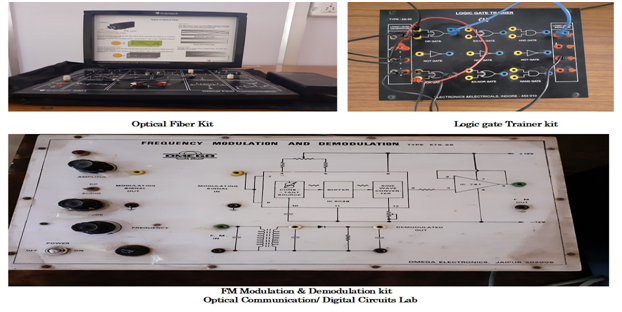
Computer/ Simulation Lab
Computer/ Simulation Lab
This Lab is used for practical courses on Control System, simulation and software. Filter Design, Antenna Simulation and Embedded Systems are a few that can be named. Fifteen computers with internet connection are available here. Some of the software available in this Lab areMatlab, Keil, EdSim etc.
The following is the list of experiments conducted in the Control System lab course:
- 1. To obtain a transfer function from given poles and zeroes using MATLAB
- 2. To obtain zeros and poles from a given transfer function using MATLAB
- 3. To obtain impulse response of a transfer function of the given system using MATLAB.
- 4. To obtain step response of a transfer function of the given system using MATLAB.
- 5. Simulation of a typical second order system and evaluation of time-domain specifications.
- 6. To draw the Root locus for a given transfer function and verification of breakaway point and imaginary axis crossover point using MATLAB.
- 7. To draw the Nyquist plot for a given transfer function using MATLAB.
- 8. To draw bode plot and obtain gain margin & phase margin for a given transfer function of the system using MATLAB
- 9. To design a lag compensator for a closed loop system
- 10. To design a lead compensator for a closed loop system
- 11. To design lag-lead compensator using closed loop system.
- 12. To obtain the transfer function from the state model using MATLAB.
- 13. To obtain the state model from the given transfer function using MATLAB.
- 14. To find impulse response of a state model for a given system using MATLAB.
- 15. To find step response of a state model for a given system using MATLAB.
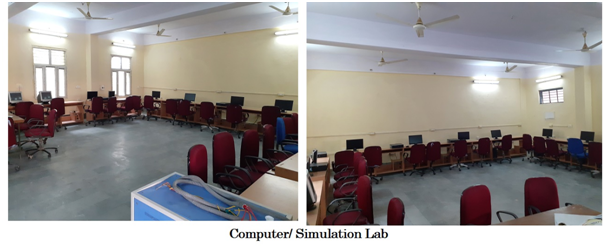
Network/ Projects Lab
Network/ Projects Lab
This Lab has kits and instruments for doing experiments on series and parallel RLC networks, 2-port networks and for verifying Network Theorems.
The following is the list of experiments conducted in the Network lab course:
- 1. To Verify Thevenin Theorem and Superposition Theorem.
- 2. To Verify Reciprocity Theorem and Millman’s Theorem.
- 3. To Verify Maximum Power Transfer Theorem.
- 4. To Determine Open Circuit and Short Circuit parameters of a Two Port Network.
- 5. To Determine A,B, C, D parameters of a Two Port Network.
- To determine h parameters of a Two Port Network.
- To Find Frequency Response of RLC Series Circuit RLC parallel Circuit and determine resonance and 3dB frequencies.
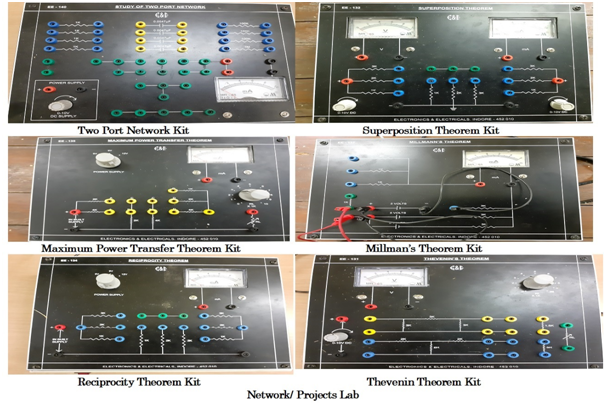
This lab has also facilities for PCB fabrication and doing electronics projects.
VLSI/ EMI Lab
VLSI/ EMI Lab
This Lab is for offering practical courses on VLSI Design. It is equipped with FPGA Trainer Kits, CPLD trainer kits and computers installed with Cadence and Xilinx.
This lab has also kits for doing experiments on Measurements and Instrumentation.
The following is the list of experiments conducted in the Electronic Measurements and Instrumentation lab course:
- 1. Study of Cathode Ray Oscilloscope.
- 2. Study of displacement measurement by LVDT.
- 3. Force measurement by strain gauge.
- 4. Measurement of Capacitor using Q-meter.
- 5. Measurement of Self-induction using Q-meter.
- 6. Temperature measurement by thermistor.
- 7. Study of optical Transducers: Photo-diode, Photo-Transistor.
- 8. Design of digital to analog converter, R-2R ladder Type and analysis of its characteristics.
- 9. To measurement of the unknown Inductance by using Maxwell’s bridge method.
- 10. To measurement of the unknown capacitance by using Schering bridge method.
- 11. To measurement of the unknown Frequency by using Wein’s bridge method.
- 12. To measurement of the unknown Inductance by using Hay’s bridge method.
- 13. To calculate Frequency and amplitude using CRO & Function Generator.
- 14. To calculate Frequency using Lissajious Pattern.
- 15. To study RVDT.
- 16. Study of Function Generator.
- 17. Temperature measurement by thermocouple.
- 18. Temperature measurement by RTD.
- 19. Study of optical Transducers: Photo conductive, Photo voltaic.
- 20. To study digital Multimeter.
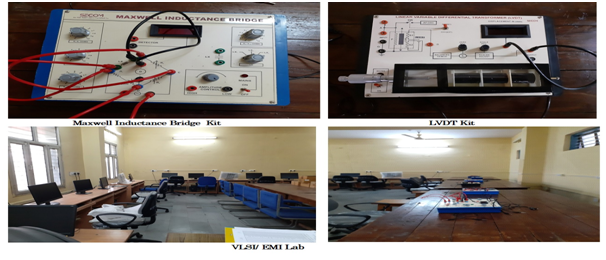
DSP/ Microwave Lab
DSP/ Microwave Lab
This Lab is equipped with 25 computers with software for designing digital filters and doing simulations on them such as Matlab with the latest Tool Boxes.
The following is the list of experiments conducted in the DSP lab course:
- 1. Generation, analysis and plots of discrete-time signals.
- 2. Implementation of operations on sequences (addition, multiplication, scaling, shifting, folding etc).
- 3. Implementation of Linear time-invariant (LTI) systems and testing them for stability and causality.
- 4. Computation and plot of DTFT of sequences, verification of properties of DTFT.
- 5. Computation and plots of z-transforms, verification of properties of z-transforms.
- 6. Computation and plot of DFT of sequences, verification of properties of DFT.
- 7. Computation and plots of linear/circular convolution of two sequences.
- 8. Computation of radix-2 FFT- Decimation in time and Decimation in frequency.
- 9. Implementation of IIR and FIR filter structures (direct, cascade, parallel etc).
- 10. Implementation of various window design techniques (Rectangular, Bartlett, Hann, Hamming etc).
This Lab has facilities for doing experiments on microwave communication. The equipments available for this are Microwave Test Benches, Power supplies and oscilloscopes.
The following is the list of experiments conducted in the Microwave lab course:
- 1. Study the characteristics of Klystron Tube and to determine its electronic tuning range.
- 2. To determine the frequency and wavelength in a rectangular wave-guide working on TE10 mode.
- 3. To determine the Standing Wave-Ratio and reflection coefficient.
- 4. To measure an unknown impedance with Smith Chart.
- 5. To study the V-I characteristics of Gunn Diode.
- 6. To study the following characteristics of Gunn Diode.
(a) Output power and frequency as a function of voltage.
(b) Square wave modulation through PIN diode.
- 7. Study the function of Magic Tee by measuring the following parameters.
(a) Measurement of VSWR at different ports and
(b) Measurement of isolation and coupling coefficient.
- 8. Study the function of Isolator / Circulator by measuring the following parameters.
(a) Input VSWR measurement of Isolator / Circulator.
(b) Measurement of insertion loss and isolation.
- 9. Study the function of Attenuator (Fixed and Variable type) by measuring the followingparameters.
(a) Input VSWR measurement.
(b) Measurement of insertion loss and attenuation.
- 10. Study the function of Multi Hole Directional Coupler by measuring the following parameters.
(a) To measure main line and auxiliary line VSWR.
(b) To measure the coupling factor and directivity.
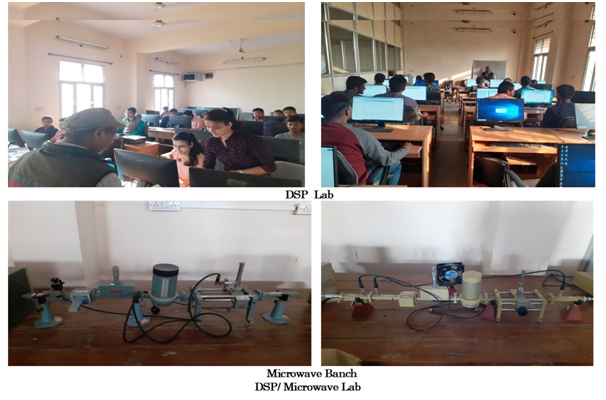
EDC/ Analog Circuits Lab
EDC/ Analog Circuits Lab
This Lab is equipped with kits and instruments for doing experiments on analog electronic devices such as OP-Amps, diodes, Timer ICs and analog circuits.
Kits for doing experiments on power electronic circuits are also available here.
The following is the list of experiments conducted in the Electronic Devices and Circuits lab course:
- 1. Diode Characteristic
a) PN junction diode Characteristics and Static & Dynamic resistance measurement from graph.
b) To plot Zener diode Characteristics curve.
- 2. Clipper Clamper
a) To plot the Characteristics curve of various clamper circuits.
b) To plot the Characteristics curve of various clamper circuits.
- 3. Half wave, full wave & bridge rectifier
a) To measure Vrms, Vdc for half wave, full wave & bridge rectifier.
b) To measure ripple factor, ratio of rectification for full wave & half wave rectifier.
- 4. Voltage regulation using zener diode shunt regulator and transistor series voltage regulator in the following cases
a) Varying input
b) Varying load
- 5. Characteristic of BJT
a) To plot the input & output Characteristics curve in CB & CE configuration
b) To find α & β and Q point from the above curve.
c) To plot the Characteristics curve of various clipper circuits.
- 6. To measure h- parameter (Av, Ai, RO &Ri) in CE Amplifier
- 7. Multi Stage Amplifier
a) To plot the Characteristics curve for Direct Coupled Amplifier.
b) To plot the Characteristics curve for RC Coupled Amplifier.
c) To plot the Characteristics curve for transformer Coupled Amplifier.
- 8. FET Characteristic
a) To plot the Characteristics curve for n channel – JFET in CS configuration.
b) To find out pinch off voltage from the above characteristics curve
- 9. UJT Characteristic
a) To plot the Characteristics curve for UJT.
b) To determine intrinsic stand off ratio.
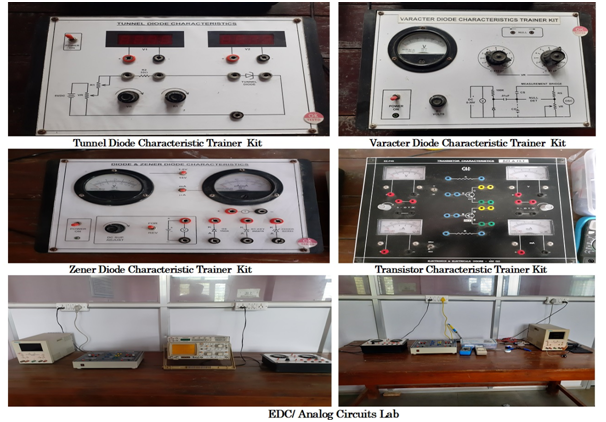
Other Facilities
Seminar Hall
The Seminar Hall of Electronics and Communication Engineering Department is equipped with a Smart TV and Set Top Box for playing the MHRD SwayamPrabha Channels.
Live telecast of Programmes like Prime Minister’s Mann Ki Baat and similar are shown here as per directions received by the MHRD, AICTE and the DTE.
Besides this, NPTEL videos are played here as part of ICT classes.
Invited lectures
Students are encouraged to participate in the seminars and webinars arranged at the Institute level on a periodic basis.
The nature of training varies from technical to personality development. Besides this,
if gaps are identified in course syllabus, expert lectures are arranged at Department level.
GATE Training
In order to equip the students to excel in GATE exam, training is provided to them free of cost.
This has started in 2018 with the help of hired agencies and funded by TEQIP-3 project.
In 2020, GATE training was provided to the students by the Department faculty members
Internship
Internship is compulsory for all students as per RGPV scheme.
Faculty members of the Department facilitate the students to identify and arrange the right Institutions
to carry out their internship. Besides this, as part of TEQIP-3 project,
the Department was able to reimburse certain expenses of the students who are undergoing internship.
Training in Computer Programming Language
After identifying certain gaps in the RGPV syllabus, students are given special training in various domains like Computer Programming,
which is very crucial for their employability. In coordination with the Training and Placement Cell,
the Department identifies the potential students and encourages them to undergo training in Computer Programming Language
like C, C++, Python, etc.
Employability Skills Training
Employability Skills Training is yet another activity that aims to bridge the gap between the Institute potential
and the Industry requirements. This is done in coordination with the Training and Placement Cell.
As part of this, students are given training to improve their soft skills and quantitative aptitude.